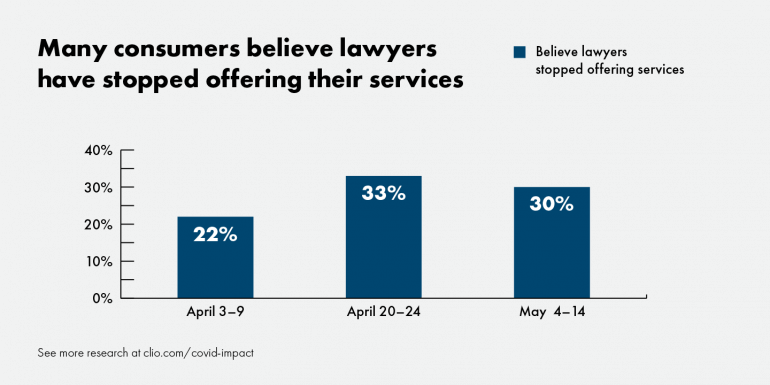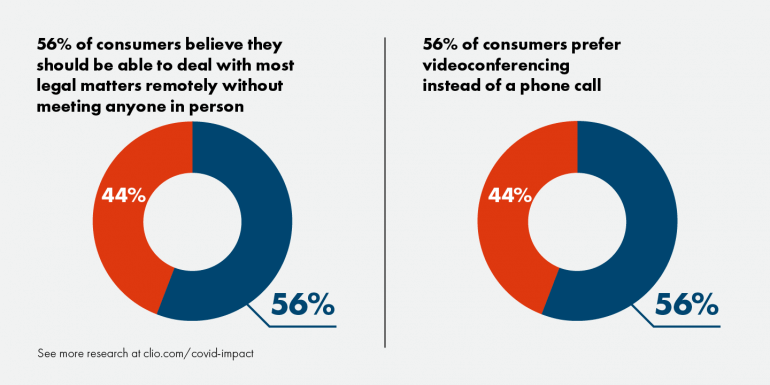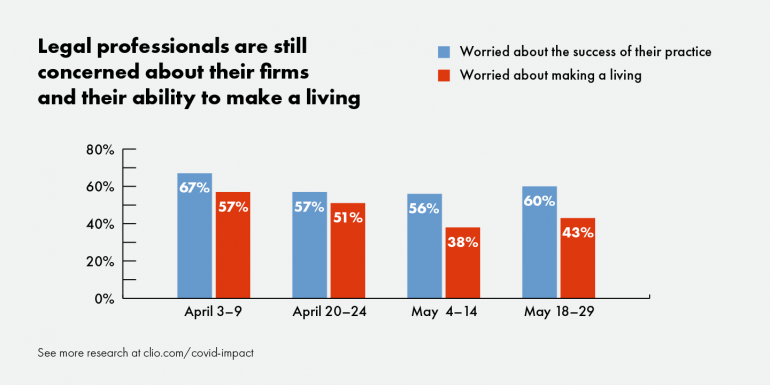Five Legal Trends Report research takeaways: Not for the faint of heart
The current pandemic has directly affected the legal industry in the same way the asteroid that hit the Yucatan Peninsula 66 million years ago staggered the dinosaurs. Several months in, lawyers are still milling about, trying to figure out what comes next, or whether anything viable comes next.
As largely ineffective and patchwork responses continue to be implemented by federal, state and local governments, reopening for various segments of the economy is scattered at best. And, while law firms remain essential businesses in most reopening plans, the economy surrounding law firms continues to crumble, just as attorneys struggle to adjust to online business models most never wanted to adopt in the first place.
Legal Trends Report Research Tracks Economic Impact of COVID-19
In a world in which there is very little clarity from one day to the next, Clio has released a second industry briefing, under its Legal Trends Report research umbrella, that endeavors to address the economic impact on law firms wrought by the coronavirus pandemic.
I’ve written about the Legal Trends Report almost every year since it has been issued, as I think it’s a wonderful deep dive into a topic that law firms often ignore: data surrounding business management in the legal space. Like the reports that precede it, this briefing includes data collected from Clio users, as well as from surveys of other legal professionals (783 respondents) and legal consumers (1,055 respondents). Of course, this second briefing in the Legal Trends Report-style is something different altogether: It’s a snapshot of a period unprecedented in modern history. So, what does it say about the present state of the legal industry, and what solo and small firm lawyers should do now to point their law firms to the future?
OK, what do you want first: the bad news or the worse news? Yeah, it’s been that kind of year.
I won’t try to address everything from the briefing and will try to leave out the obvious and less impactful items. That being the case, here are five takeaways, not for the faint of heart.
1. Pivot Foot: Can Your Law Firm Transition?
Linked from the special briefing is Clio’s COVID-19 impact homepage, where you’ll find continuing updates of legal industry economics across several broad categories. You will see, among other things, real-time statistics respecting new matter creation in states and by practice area. Toggle by practice area to find out which niche practices are soaring or sinking. See how business-related cases are being generated above the industry baseline. Note how the expected great rush to bankruptcy has not hit yet — potentially due to government initiatives artificially forestalling the same (more on that later).
But, what you want to understand here is that, while practice area volatility is common within law firms, the swings are even more violent now. Firms that tend to chase trends like tortoises race after hares, thinking they’ll win in the end, will need to act faster. Now is the time to be thinking about what happens to your practice mix today and moving forward.
A starting point may be the Clio matter creation data, which will help you to identify trends. But you should also consider how your existing practice areas have changed before adopting new ones. Should your real estate practice move to a focus on loan workouts? Should your education law practice start to focus on IEPs, and the havoc distance learning will wreak on them in the fall? Even for hyper-niches, like student loan law, how will Joe Biden’s proposed plan (should he be elected president) to forgive certain student loans in light of the current economic crisis affect the bottom line for your practice into the future?
2. Full Stop: Do Your Potential Clients and Referral Sources Know What You’re Doing?
The special report indicates that between April 20-24, 33% of consumers surveyed believed that law firms had stopped offering legal services. This certifies a very specific failure of imagination on the part of law firms. When the pandemic first hit, and for sometime after, law firms were in shock; lawyer-managers had no idea what to do. Then, they started releasing those emails about COVID-19 precautions they were taking, like every other business in the world.
Of course, it’s one thing to tell your business contacts that you’ve acquired an elusive container of Clorox wipes, and entirely another to communicate what the state of your business interests might be at that given time. It’s no wonder consumers thought law firms were closed (even though law firms have been labeled essential businesses since the very start of the pandemic): Many law firms never directly told their clients or referral sources they were open.
Lawyers are haunted by the nomenclature of the “ambulance chaser” and don’t want to seem ghoulish in taking advantage of the prevailing situation. So, most attorneys will say nothing at all. But consumers thirst for direct information about the legal process, and the state of their cases, potential and actual. Law firms need to be far more direct about the information they provide. For example:
- If you’re an estate planning attorney, provide content about whether virtual notary rules exist in your jurisdiction, and how they apply. Or, offer the alternative of a trust to a will — since it avoids probate, and also doesn’t have to be notarized.
- If you’re a divorce attorney, what can people do while the courts are closed? If they can’t actually file cases, is mediation a viable alternative?
Answer the direct questions your clients would have about the pandemic and its effect on the legal process.
3. Zoom Bomb: Converting to a Digital Intake Process
Of course, the appropriate messaging, buttressed by content marketing, is only the first volley of an engagement. A law firm must also be able to convert the leads it acquires at a high percentage. Traditionally, lawyers have relied on in-person methods for managing intakes, including one-on-one meetings, wet (pen-and-paper) signatures and tangible payment preferences, like checks. But now, when clients may not want to see you even if you are open, those analog operations are starting to give way to digital processes. And just in time. According to the Legal Trends Report briefing, 56% of consumers surveyed now prefer videoconferencing to phone calls, and also believe that most legal matters can be dealt with remotely.
It’s no surprise, then, that roughly 75% of legal professionals said they feel equipped to manage electronic documents, electronic signatures and video conferencing. They’d better.
4. Surge Protection: Will Legal Business Crest?
When the reach and potency of the coronavirus became known, governments eventually began to shut down the economy, and, at first, the vast majority of citizens around the world accepted the consequence. The economy became a secondary consideration to a muddled global health and welfare initiative. But, the cauldron has become further clouded. Some prognosticators, feeling that the economy would open more quickly than it has, predicted a quick rebound. Now it appears that, even as restrictions lift across the world, consumers are not ready to fully embrace a stilted version of society, from behind masks and at an appropriate distance away. Personally, I won’t send my kids to camp or school, or even eat inside a restaurant, until I don’t have to feel like my family and I are denizens of hastily constructed Petri dishes.
So, the right question is perhaps not when the economy will recover, but how.
The special report indicates that consumers are anticipating COVID-19-related claims at nearly the same rate that they’re anticipating the resumption of standard legal claims. Yet almost half of the consumers surveyed in April indicated they would put off dealing with legal issues until the world returned to normal. When that occurs is anybody’s guess, and whether those claims will remain ripe is an open matter. The expected surge may never come or may come later than expected — leaving lawyers waiting around in expectation like John Cusack lifting a boombox. If so, the economic recovery is decidedly a long game.
Of course, there’s also the darkest timeline.
5. Point Break: Does the Bottom Fall Out?
Given the calamitous nature of the situation, things have been relatively stable from an economic perspective. That’s almost entirely because of a massive U.S. government bailout continuing into the summer. But, this is not just about the continuation of generous unemployment benefits packages; it’s also about freezes on many recurring payments and collections. While not my usual choice for news, this Buzzfeed article convincingly argues that without another Herculean effort from the federal government, the wheels may fall off entirely at summer’s end, thereby ripping away the foundation of financial support now keeping many Americans afloat. And, while another round of PPP loans has been made available, it’s fair to wonder how long the federal government will be willing or able to prop up small businesses, especially if an expected second surge of the coronavirus ramps up this summer and a potential vaccine does not arrive by the end of the year.
According to the research, 35% of legal professionals surveyed between May 18-29 said that government assistance was essential to the survival of their business. What happens when that assistance no longer becomes available? If that statistic is extrapolated for the hypothetical United States that no longer offers small business bailouts, does that mean one-third of all American law firms will shut down?
Depending on the running of other economic contingencies, that could represent the chiming of the Doomsday Clock for the legal industry as we know it.
You might like these related articles:
-
- “Five Most Common Tech Challenges in the New Remote Work Normal” by Eli Nussbaum
- “Is Your Crisis Communication Plan Ready for a Pandemic?” by Gina Rubel
- “How Get More Leads Before (and after) the COVID-19 Crisis” by Mike Ramsey
- “How Are Law Firms Shifting Business Development Plans and Tactics?”
- “Working from Home: Use the Right Tools” by Toland Lawrence
- “Remote Work: How to Make It Work for Your Law Firm” by Tomas Suros



















